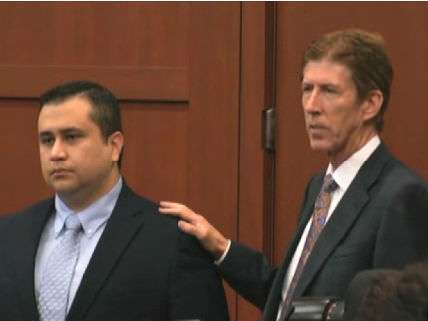If 'Stand Your Ground' Is Not About the Duty to Retreat, Why Call It That?

The Atlantic's Ta-Nehisi Coates faults me for saying that "the only context in which 'stand your ground' was mentioned during [George Zimmerman's] trial was as part of the prosecution's attempt to undermine Zimmerman's credibility by arguing that he lied when he told Fox News host Sean Hannity that he had not heard of the law until after the shooting." Not so, says Coates, since "stand your ground" language was included in the jury instructions—a fact that I noted in the very same blog post. I suppose I should have said that Zimmerman's alleged lie about his familiarity with Florida's self-defense law was the only context in which "stand your ground" was mentioned during testimony or argument, unless you count prosecutor John Guy's declaration that "this case is not about standing your ground." Indeed it was not, for the simple reason that Zimmerman, according to his own account (which apparently was accepted by the jury), had no chance to escape once he was attacked by Trayvon Martin, making the absence of a duty to retreat irrelevant. Coates concedes as much:
It's very true that Zimmerman's narrative holds that he never had the opportunity to retreat, and thus SYG was not relevant to his specific defense….I do not think you can argue that Zimmerman would have been convicted if not for Stand Your Ground.
But hang on, says Coates. The "stand your ground" law may not have prevented Zimmerman's conviction, but it did delay his arrest, since it says police may not arrest someone who claims his use of deadly force was justified by self-defense unless they have probable cause to doubt his story. Coates correctly notes that the six-week delay in arresting Zimmerman was what made this case a focus of outrage and national press attention. But as I have repeatedly pointed out, the probable-cause requirement, although it was added by the same 2005 bill that abolished the duty to retreat for people attacked in public places, is completely distinct from the "stand your ground" principle. Even a state that imposes a duty to retreat could establish the same standard for arresting someone who claims self-defense. The main criticism of Florida's post-2005 self-defense law is that its rules for the use of force are too permissive, authorizing violence in situations that do not really justify it. Maybe that is true in other cases. But the idea that the right to stand your ground let George Zimmerman get away with murder is simply not supported by the facts.
Coates says that when NAACP President Benjamin Jealous responded to Martin's acquittal by calling for "the removal of Stand Your Ground laws in every state," he was "correctly invoking the set of laws by the name which they have long been known." But what is Jealous's main objection to these laws? It can't be the probable-cause rule that may have delayed Zimmerman's arrest, since that provision does not explain his acquittal and in any case is not shared by all the laws Jealous opposes. He must have in mind the "stand your ground" provision, which he mistakenly blames for Zimmerman's acquittal, since eliminating the duty to retreat is the defining feature of these laws.


Show Comments (209)